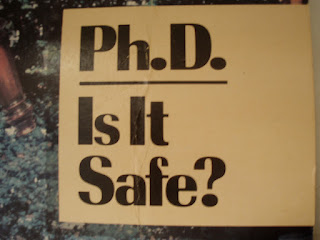Laura Blankenship, https://creativecommons.org/licenses/by-sa/2.0/
Over the summer, I passed my comprehensive examinations, which were every bit as brutal as the name suggests. I answered three questions with 17 pages each, not including references. Comps were a gateway to ensure that I was ready to begin my dissertation, and the resources that I created when answering the questions will be useful in my dissertation.
That is the only thing left to do, though in saying it, I hear something like, “I just rowed from Cuba to Florida. Now I only have to walk to Maine.” This is where many PhD candidates stall, the “ABD” (All But Dissertation) phase, which really amounts to just a very expensive addition to the master’s degree.
I suspected that many doctoral students stall at the change to candidacy because the nature of study changes, abruptly and completely. For three years, my routine was regimented and predictable – read about 125 pages per week, make discussion posts on Wednesday and Saturday, reply to the posts of others by Thursday and Sunday, write a 40-page paper. It was objective, too, with grading rubrics available on the first day of every class. Now my schedule is my own, to go as fast as I wish and can. The standards, despite the ontological, epistemological, and axiological assumptions of the logical positivism on which my dissertation is based, are largely subjective and variable within a range of probable options.
I imagine that many candidates remember the whole world outside of school and, without someone else setting a structure and standards and deadlines to meet, those candidates forget the goal, relax, cool off, catch their breath and abandon the journey. My school does not allow that. I work with my mentor to set realistic and achievable goals to meet each quarter, to keep me moving. If I fail to meet my goals for two consecutive quarters then I’m out of program. Get it done or get out, the more scatological version of this sentiment being equally, if not more, applicable as well.
Before I finish, and become a PhD, I’m going to write about 250 pages and administer a brief reading comprehension quiz to about 150 undergraduate students. I’m going to crunch many numbers and test three hypotheses and publish something that probably no one will ever read again. I will have to keep all of my research materials for seven years and then completely destroy them.
As I have written before, though, I do not think that the challenge is purely, or even primarily, cognitive. A week into my first dissertation quarter, I realize that until I finish this degree, everything that I do is going to be wrong. That’s unpleasant, but it also makes sense, in that I haven’t done this or anything like this before, and it is liberating, almost hilarious, to say it. If there is no chance at all of getting it right the first time then I just have to do it, do all of it, and then listen carefully to the criticism (“feedback”) so that I get it right the second time. Maybe the third. I will have to learn.
The second emotional challenge is much harder. Since fall 2014, my world has been organized around doctoral study. It has been, properly, the most important thing in my life, and whenever something conflicted with my studies, the other had to be negotiated.
However, I still have the friends that I had three years ago. Without comps, I probably would have gone to a few more Blue Rocks games and managed the Pennsylvania road trip that I wanted to take last summer, but those will still be possible next summer. With friends, I finally made it to Mauch Chunk in August, and to a Midnight Oil concert at the Keswick in the spring. I took a break from church and I missed some meetings of my lodge and Amnesty International that I would have made otherwise, but I did not quit or disappear from any of these places. Doctoral study has not consumed my life but it has given me structure and purpose.
Since fall 2014, I have had the joy of being lost in the present, being lost in a task greater than myself, being committed to a clear and important and valuable goal. Sometime in 2018, maybe in spring and if not then in summer, that will be over. Then what? That is the question that frightens me now. Yes, I am tired of study, but what happens to me when I cease to be a PhD candidate and become a PhD with nothing left to accomplish? When I finally reach the summit, with nothing left to climb? I can see how that would be so terrifying that a PhD candidate might drag his or her heels, try to linger where the world makes sense and the mission is clear.
Even in the writing of it, though, I can see how ridiculous it is. Nothing left to accomplish? How is that possible? This, too, is hilarious, and as with the iterations of my dissertation, and feedback, yet to come, it is difficult and uncomfortable only because I have not done it. Each dissertation quarter starts with an awkwardly-named “Plan of Action” (for what purpose is a plan but to guide action?). I need a plan for life as a PhD, what I want to do with the degree now, as this has changed since I started, and with the life that comes with the degree. What am going to do in Maine after I walk there?

This comment has been removed by a blog administrator.
ReplyDeleteThis comment has been removed by a blog administrator.
ReplyDeleteThis comment has been removed by a blog administrator.
ReplyDelete